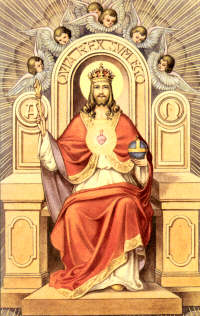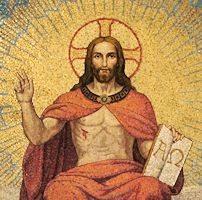Make your gift today!
Help keep Catholics around the world educated and informed.
Already donated? Log in to stop seeing these donation pop-ups.
Ordinary Time: November 22nd
Solemnity of Christ the King
Other Titles: Feast of Christ the King
» Enjoy our Liturgical Seasons series of e-books!
On this last Sunday of the liturgical year, we are celebrating the Solemnity of Christ the King, a Feast established relatively recently but which has deep biblical and theological roots. The title "King", designating Jesus, is very important in the Gospels and makes possible a complete interpretation of the figure of Jesus and of his mission of salvation. In this regard a progression can be noted: it starts with the expression "King of Israel" and extends to that of universal King, Lord of the cosmos and of history, thus exceeding by far the expectations of the Jewish people. It is yet again the mystery of Jesus Christ's death and Resurrection that lies at the heart of this process of the revelation of his kingship. When Jesus is hung on the Cross, the priests, scribes and elders mock him saying: "He is the King of Israel; let him come down now from the cross, and we will believe in him" (Mt 27: 42). In fact, it is precisely as the Son of God that Jesus freely gives himself up to his Passion. The Cross is the paradoxical sign of his kingship, which consists in the loving will of God the Father in response to the disobedience of sin. It is in the very offering of himself in the sacrifice of expiation that Jesus becomes King of the universe, as he himself was to declare when he appeared to the Apostles after the Resurrection: "All authority in Heaven and on earth has been given to me" (Mt 28: 18).
But in what does this "power" of Jesus Christ the King consist? It is not the power of the kings or the great people of this world; it is the divine power to give eternal life, to liberate from evil, to defeat the dominion of death. It is the power of Love that can draw good from evil, that can melt a hardened heart, bring peace amid the harshest conflict and kindle hope in the thickest darkness. This Kingdom of Grace is never imposed and always respects our freedom. Christ came "to bear witness to the truth" (Jn 18: 37), as he declared to Pilate: whoever accepts his witness serves beneath his "banner", according to the image dear to St Ignatius of Loyola. Every conscience, therefore, must make a choice. Who do I want to follow? God or the Evil One? The truth or falsehood? Choosing Christ does not guarantee success according to the world's criteria but assures the peace and joy that he alone can give us. This is demonstrated, in every epoch, by the experience of numerous men and women who, in Christ's name, in the name of truth and justice, were able to oppose the enticements of earthly powers with their different masks, to the point that they sealed their fidelity with martyrdom.
Dear brothers and sisters, when the Angel Gabriel brought the announcement to Mary, he predicted that her Son would inherit the throne of David and reign forever (cf. Lk 1: 32-33). And even before she gave him to the world, the Blessed Virgin believed. Thus she must certainly have wondered what new kind of kingship Jesus' would be; she came to understand by listening to his words, and especially by closely participating in the mystery of his death on the Cross and in his Resurrection. Let us ask Mary to help us too to follow Jesus, our King, as she did, and to bear witness to him with our entire existence.
— Pope Benedict XVI, Angelus Address, November 22, 2009
According to the 1962 Missal of Bl. John XXIII the Extraordinary Form of the Roman Rite this feast is celebrated on the last Sunday of October.
Christ the King as Represented in the Liturgy
 The liturgy is an album in which every epoch of Church history immortalizes itself. Therein, accordingly, can be found the various pictures of Christ beloved during succeeding centuries. In its pages we see pictures of Jesus suffering and in agony; we see pictures of His Sacred Heart; yet these pictures are not proper to the nature of the liturgy as such; they resemble baroque altars in a gothic church. Classic liturgy knows but one Christ: the King, radiant, majestic, and divine.
The liturgy is an album in which every epoch of Church history immortalizes itself. Therein, accordingly, can be found the various pictures of Christ beloved during succeeding centuries. In its pages we see pictures of Jesus suffering and in agony; we see pictures of His Sacred Heart; yet these pictures are not proper to the nature of the liturgy as such; they resemble baroque altars in a gothic church. Classic liturgy knows but one Christ: the King, radiant, majestic, and divine.
With an ever-growing desire, all Advent awaits the "coming King"; in the chants of the breviary we find repeated again and again the two expressions "King" and "is coming." On Christmas the Church would greet, not the Child of Bethlehem, but the Rex Pacificus — "the King of peace gloriously reigning." Within a fortnight, there follows a feast which belongs to the greatest of the feasts of the Church year — the Epiphany. As in ancient times oriental monarchs visited their principalities (theophany), so the divine King appears in His city, the Church; from its sacred precincts He casts His glance over all the world....On the final feast of the Christmas cycle, the Presentation in the Temple, holy Church meets her royal Bridegroom with virginal love: "Adorn your bridal chamber, O Sion, and receive Christ your King!" The burden of the Christmas cycle may be summed up in these words: Christ the King establishes His Kingdom of light upon earth!
If we now consider the Easter cycle, the luster of Christ's royal dignity is indeed somewhat veiled by His sufferings; nevertheless, it is not the suffering Jesus who is present to the eyes of the Church as much as Christ the royal Hero and Warrior who upon the battlefield of Golgotha struggles with the mighty and dies in triumph. Even during Lent and Passiontide the Church acclaims her King. The act of homage on Palm Sunday is intensely stirring; singing psalms in festal procession we accompany our Savior singing: Gloria, laus et honor tibi sit, Rex Christe, "Glory, praise and honor be to Thee, Christ, O King!" It is true that on Good Friday the Church meditates upon the Man of Sorrows in agony upon the Cross, but at the same time, and perhaps more so, she beholds Him as King upon a royal throne. The hymn Vexilla Regis, "The royal banners forward go," is the more perfect expression of the spirit from which the Good Friday liturgy has arisen. Also characteristic is the verse from Psalm 95, Dicite in gentibus quia Dominus regnavit, to which the early Christians always added, a ligno, "Proclaim among the Gentiles: the Lord reigns from upon the tree of the Cross!" During Paschal time the Church is so occupied with her glorified Savior and Conqueror that kingship references become rarer; nevertheless, toward the end of the season we celebrate our King's triumph after completing the work of redemption, His royal enthronement on Ascension Thursday.
Neither in the time after Pentecost is the picture of Christ as King wholly absent from the liturgy. Corpus Christi is a royal festival: "Christ the King who rules the nations, come, let us adore" (Invit.). In the Greek Church the feast of the Transfiguration is the principal solemnity in honor of Christ's kingship, Summum Regem gloriae Christum adoremus (Invit.). Finally at the sunset of the ecclesiastical year, the Church awaits with burning desire the return of the King of Majesty.
We will overlook further considerations in favor of a glance at the daily Offices. How often do we not begin Matins with an act of royal homage: "The King of apostles, of martyrs, of confessors, of virgins — come, let us adore" (Invit.). Lauds is often introduced with Dominus regnavit, "The Lord is King". Christ as King is also a first consideration at the threshold of each day; for morning after morning we renew our oath of fidelity at Prime: "To the King of ages be honor and glory." Every oration is concluded through our Mediator Christ Jesus "who lives and reigns forever." Yes, age-old liturgy beholds Christ reigning as King in His basilica (etym.: "the king's house"), upon the altar as His throne.
—Excerpted from The Church's Year of Grace, Pius Parsch
Highlights and Things to Do:
- A plenary indulgence is granted to the faithful who on the solemnity of Our Lord Jesus Christ, King of the Universe, publicly recite the Act of Dedication of the Human Race to Christ the King (Iesu dulcissime, Redemptor); a partial indulgence is granted for its use in other circumstances.
- A procession for Christ the King on this feast day, either in the Church or at home is appropriate for this feast. The Blessed Sacrament would be carried and the procession would end with a prayer of consecration to Christ the King and Benediction. Try to participate if your parish has a Christ the King procession. If not, try having one at home (minus the Blessed Sacrament).
- Read Pope Pius XI's encyclical Quas primas (On the Feast of Christ the King) which shows that secularism is the direct denial of Christ's Kingship.
- Listen to the Catholic Culture audiobooks read by James Majewski:
- Listen to the Catholic Culture podcast on interview by Thomas Mirus: 90—Leo XIII on the State’s Duties Toward the Church—Thomas Pink
- Learn more about secularism — read the Annual Statement of the Bishops of the United States released on November 14, 1947.
- Being a relatively newer feast on the Liturgical calendar, there are no traditional foods for this day. Suggested ideas: a wonderful family Sunday dinner, and bake a cake shaped as a crown or King Cake or a bread in shape of a crown in honor of Christ the King. See Catholic Cuisine for other ideas.






